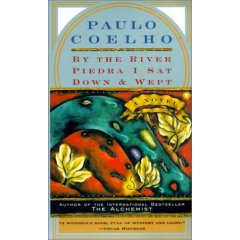* Book Review: By the River Piedra I sat and wept

By the River Piedra I Sat Down and Wept - Paulo Coelho
"By the River Piedra I Sat Down and Wept" is another novel by Coelho that proves that love is not an obstacle to materializing one's dreams, but a force urging the lovers to conquer their dreams and thus find God. Coelho has once again used his successful formula when writing this novel: poetic prose, symbolism, an air of mysticism, and his usual "follow your dream" theme.
Just like "The Alchemist", "By the river Piedra"... is a story about a journey symbolizing the route towards self-discovery. "By the river Piedra"..., however, could more easily be described as a story of love, as it strives to show that "true love is an act of total surrender". At a deeper level, Coelho also gives the message that as there are no rules when it comes to love, there are no rules when it comes to worshiping God: "to love is to be in communion with the other, and to discover in that other the spark of God".
In this best-selling novel Coelho talks about a long-forgotten aspect of God: His feminine side, the so-called “Goddess”. The feminine face of God has been, as Coelho explains, present in every religion on the face of the earth: paganism (Great Mother), the ancient fertility goddess, Isis, the Virgin Mary. This Goddess, presented as generator of all life, is present in the love the two main characters feel for each other. It is as if Her presence haunts their relationship. The monk turned Goddess-worshiper at first thinks he’s faced with the dilemma of staying with the woman he loves and abandoning the life that fulfils him, or venturing on his planned mission to change the world. In the end he discovers that a choice need not be made: to love a woman is to love life itself.
The love between the couple is one that develops, and it goes through many levels: the childhood love, love hidden behind the bars of inhibition and oppressed feeling when they reunite, the liberated love whereby Pilar regains her “faith” and changes her philosophy on life, and whereby her lover decides to deny his nature and sacrifice his “gift” to have a normal life with Pilar, and the enlightened love which allows both lovers to conquer their dreams.
Just like fear of failure prevented some people from achieving greatness in “The Alchemist”, fear of rejection prevented the lovers from expressing their love in “By the river Piedra…” The expulsion of this fear is vividly symbolized with the deliberate breaking of a glass at a restaurant. This gesture shows that to surrender to love we must break through our fears and break all the rules and formulae. Also, to convert to the faith of the Goddess, which is seen as heresy by many, one must see beyond everything one’s parents taught one about religion and the limits of life.
When the glass is broken and the two lovers are liberated from all inhibition comes the kiss, the description of which is an excellent example of Coelho’s poetic style: “a kiss born by the rivers of our childhood when we didn’t yet know what love meant…in the moment of that kiss were years of searching, disillusionment and impossible dreams”.
At an age when everything has been discovered, Coelho suggests that there are greater discoveries to be made: those of the spirit. The two lovers have made the discovery that all people can speak the language of angels and perform miracles. Now their mission is to let the whole world know, “and experience the agony and ecstasy of pioneers”.
“By the river Piedra…” is an enjoyable love story that may also be seen as a metaphysical allegory. It is a characteristic sample of Coelho’s writing, and some questions are raised by the paradox of Coelho urging people not to use formulae in their lives and yet he once again uses the formula that gave him his best-selling status. Nevertheless, this novel, like all the novels he has written, is a delightful read which gives the reader a sense of much-needed faith in humankind.
~ Book review by Anna Hassapi



0 Comments:
Post a Comment
<< Home